 Richard Davies, Director of the Marches Energy Agency.
Richard Davies, Director of the Marches Energy Agency.
This year I celebrate 10 years as director of Marches Energy Agency, a charity that encourages communities to adopt low carbon lifestyles. We believe that acting locally can help shrink the global carbon footprint.
We support and sustain energy-saving practices in all sectors of the community – parish, schools, businesses and households through five radical carbon-cutting projects. We can only say ‘job done’ when all the cavities have been filled, when all the community leaders have been trained, when the whole community has been engaged in this process.
Our daily work involves getting microgeneration installations on community buildings, giving advice to small businesses on how to obtain energy-saving grants, talking to low income families about how to get free insulation and working with schools on climate change education.
This work has achieved massive energy savings in 10 communities in Staffordshire, Herefordshire & Shropshire. In just one year, through local renewable energy, energy efficiency and other measures we helped over 60,000 individuals including the insulation of 4,500 homes saving 16 million kWh of energy a year.
For MEA there will never be a ‘declaration of peace’ moment in the war against climate change. We cannot afford to be complacent. Every day I meet brilliant individuals and witness inspiring projects giving their all to fight climate change. But I also see complacency, tired excuses and indifference. So there is still much more to be done.
Over the next 10 years we will continue this work, Copenhagen or not, helping communities recognise that they can play a significant part in achieving a low carbon future.
Read more Voices on Copenhagen
The Marches Energy Agency in Shropshire runs five environmental projects working together to reduce the carbon footprint of local communities.
View the Ashden Awards video of Marches Energy Agency:
Monday, 14 December 2009
Tuesday, 8 December 2009
Waving to Copenhagen
Guest post by Anne Wheldon, Technical Director at the Ashden Awards.
On Saturday, I went to London with my husband to take part in ‘the Wave’ – the national demonstration to highlight the seriousness of climate change and the need to take action, before the Copenhagen COP meeting. I’m not a ‘Frequent Demonstrator’ but I just felt that it was so important to be there and be counted. And it seems that over 40,000 other people thought the same. The numbers meant that we were still a long way up Whitehall at 3pm, when ‘the Wave’ encircled the House of Commons, but we still waved our placards and blew our whistles.
- There were people there of all ages, and representing such different interests. I don’t think there are many causes for which the Royal Society for the Protection of Birds, many faith groups, cyclists and the Socialist Workers Party would all march together.
- Although it was a cheerful event, there was also a strong sense of the absolute seriousness of the issue, with many people mentioning injustice – the injustice of how climate change is already having its most serious impacts on those least able to adapt, the injustice of our excesses leaving a damaged world for the future. There were serious conversations going on amidst the noise - it’s not often that complete strangers come up to you and start a discussion about green jobs.
- It was a great idea to have a colour theme, with innovative uses of the colour blue in clothes, wigs, face paint, banners and placards. I’m quite tempted to suggest a colour theme for the next Ashden Awards annual conference….
Guest post by Anne Wheldon, Technical Director at the Ashden Awards. Click here to read the rest of this post.
Monday, 7 December 2009
Housing Retrofit is the biggest carbon saver
 John Doggart, director of The Sustainable Energy Academy.
John Doggart, director of The Sustainable Energy Academy.
Housing emits 27% of the UK’s carbon emissions, providing a huge challenge for the year’s ahead. But the good news is that even owners of the five million older homes have the power to drastically reduce carbon. By retrofitting old houses with energy saving measures you can save between 60-80% of the property’s carbon footprint.
We’re calling on the government to help homeowners and social housing landlords by kick-starting a massive retrofit process. By providing low interest finance that makes repayment costs lower than fuel bill saving, the UK will move closer to meeting the goal of using 80% less carbon by 2050. German experience has shown that a euro spent by Government can stimulate up to six euros of energy improvements.
The Sustainable Energy Academy has set up the Old Home Superhome campaign, a network of more than 40 exemplar hard-to-treat homes across the UK that have reduced their energy use by at least 60 percent. We help ‘Superhome’ owners promote their achievements by opening their houses to the public during Open Days.
The Open Days have inspired thousands of visitors to take action in their own homes by seeing and experiencing the warmth and comfort of a low carbon home, and how easy it is to achieve.
“But how much does it cost?” everyone asks. About the same as you would spend on upgrading a kitchen or bathroom. Well worth it for the huge carbon savings you can make for yourself and for the planet.
Read more Voices on Copenhagen
The Sustainable Energy Academy (SEA) is spearheading the Old Home SuperHome scheme to transform the existing housing stock in the UK, with the ultimate aim of reducing domestic carbon emissions by 60%.
View the Ashden Awards video of SEA:
Developing countries need appropriate, low-cost technologies
 Amitabha Sadangi is Director of International Development Enterprises India (IDEI), winner of the Ashden Award’s Outstanding Achievement Award in 2009.
Amitabha Sadangi is Director of International Development Enterprises India (IDEI), winner of the Ashden Award’s Outstanding Achievement Award in 2009.
The gravity and magnitude of climate change demands that we get down to quick, firm and sustainable action. I believe our environmental problems are of our own making and if we want to change what lies ahead we need to look at the actions of today.
IDEI is addressing the needs of poor farmers in India by promoting appropriate technologies and by optimising the use of water for irrigation. We have developed a simple treadle pump and drip irrigation technology for small hold farmers that are low cost and environment friendly. Together the two technologies have led to saving over 530 million litres of diesel, over 3000 million cubic meters of water and 417 million kWh of electricity,
Over one million farmers have adopted our technologies – that is around five million people - and made a net income of $1 billion.
We are fixing what exists. As the World Economic Forum highlighted recently, drip irrigation is improving irrigation systems, with reduced wastage of water through evaporation. Now we are advocating for greater accountability by questioning “subsidies” that are leading to the exploitation of our precious water resource.
IDEI does not believe in charity: we strategically leverage grants from donors to create markets for technologies - thus bringing down the overall cost for the farmer. By linking farmers and others in the supply chain to credit and by using Bollywood films to market the technologies we have made sure that they reach poor farmers throughout India, with interest growing in other parts of Asia and Africa.
Read more Voices on Copenhagen
International Development Enterprises India (IDEI) has developed extensive local supply chains to manufacture, distribute, sell and install the treadle pump, branded ‘Farmer’s Friend’
View the Ashden Awards videos of IDEI:

Ashden Award winners are pathfinders to a more sustainable future
 Sarah Butler-Sloss, Founder Director of the Ashden Awards for Sustainable Energy.
Sarah Butler-Sloss, Founder Director of the Ashden Awards for Sustainable Energy.
Sustainable energy sources which reduce carbon, bring health and education opportunities and a better life to millions worldwide are not some distant dream – they are being used today by over one hundred Ashden Award-winning programmes.
Thousands of miles from Copenhagen, in countries like India, China, Tanzania and Brazil, there are outstanding enterprises delivering affordable and appropriate renewable energy technologies at a local level but on a large scale.
Renewable energy is transforming the lives of people in the developing world: women cooking on safe and efficient smoke-free stoves; children studying with solar lamps and farmers trebling their incomes by using simple treadle pumps to irrigate their crops. A study we commissioned in 2008 found that over 10 million peoples’ lives are being improved thanks to the work of just ten Ashden Award winners.
In the UK, Ashden Award winners are using renewable energy technologies, energy efficiency schemes and decentralised, low carbon sources of heat to create jobs, boost businesses and reduce fuel poverty while at the same time substantially reducing carbon emissions.
However, all these technologies need the political and financial will to scale-up and reach many more millions of people. Now is the time to back these and similar pathfinders to a sustainable future and generate huge social, economic and environmental benefits.
Read more Voices on Copenhagen
The Ashden Awards champion practical, local energy solutions that cut carbon, protect the environment, reduce poverty and improve people’s lives.
Monday, 16 November 2009
Grasping the golden opportunity for a low carbon economy
 Dr Phil Webber, Programme Manager, Kirklees Warm Zone.
Dr Phil Webber, Programme Manager, Kirklees Warm Zone.
Copenhagen needs to be a massive wake-up call for governments to realise the huge economic and social benefits that a low carbon economy can offer.
All the evidence we have from the Kirklees Warm Zone scheme shows that rolling out insulation and other large-scale energy efficiency schemes generates multiple benefits. Economically it brings job creation, skills development, fuel savings and increased benefits uptake. Every £1 invested returns around £5 into the local economy. This equates to over £90m going into the economy. An area-based scheme like ours delivers significant efficiency savings too.
The social impact means fewer families living in fuel poverty; warmer homes for the elderly and people with long term health conditions and fewer cases of carbon monoxide poisoning.
Add to this the environmental impact of reduced carbon - the estimated CO2 savings from 32,000 households are 22,556 tonnes per year for our measures installed up to June 2009. The expected savings at the end of the Warm Zone scheme are 55,000 tonnes per year.
A new report by the Audit Commission (October 2009) concludes that reducing CO2 emissions from domestic energy use is one of the quickest, cheapest and most effective ways to achieve the UK’s CO2 reduction targets. We would like the UK government to use existing Winter Fuel Payments to roll-out schemes like Kirklees Warm Zone on a wider scale. This should be part of the fiscal stimulus measures advocated in the Stern Report and would be a clear signal to the international community that the UK is taking serious and concerted action to reduce its own emissions.
We already have the evidence of what works. Copenhagen is a golden opportunity to convert this evidence into positive action that will save us all from the nightmare of climate change.
Read more Voices on Copenhagen
Kirklees Council’s Kirklees Warm Zone scheme won the Ashden Award Local Government category in 2009. The scheme is now used as an example of good practice across the UK by government departments, key environmental groups and other local authorities and has won several awards.
View the Ashden Awards video of Kirklees Council:
Our schools can show the way to a better future
 Richard Dunne, Head teacher, Ashley school, Walton On Thames, Surrey.
Richard Dunne, Head teacher, Ashley school, Walton On Thames, Surrey.
Climate change is an ugly problem with devastating consequences. But it is a problem based fundamentally on our use of energy and it is a problem that can be solved. Indeed climate change offers us exciting opportunities to create a better, cleaner, more sustainable model of energy practice. But it needs all of us to find the solutions; to find them in our workplace, in our schools, homes, and communities. And we must start now.
But how? Ashley School has set up committed and passionate energy teams who challenge the status quo and identify where and how we can become more energy efficient. These teams measure and analyse the school’s energy use, and set tough targets that engage our communities in energy saving. We know from experience that these energy reduction initiatives need to be supported through grant funding programmes – which ideally should be sourced by a carbon tax – so that site-specific renewable energy technologies can be installed.
Most importantly, we recognise and reward our successes. In our school we are proud to have reduced our electricity consumption by nearly 80% in two years and our heating consumption by close to 30%. With creativity and commitment it can be done and we whole-heartedly encourage others to do the same – we have nothing to lose and everything to gain.
Read more Voices on Copenhagen
Ashley CofE Primary School, Walton on Thames in Surrey was joint winner of the UK Schools Ashden Award 2009. The school takes a pioneering approach to energy saving by setting targets to reduce energy consumption both inside the school and at home.
View the Ashden Awards video of Ashley school:
Friday, 13 November 2009
The real agenda for Copenhagen is tackling poverty
 Harish Hande, CEO, Selco Solar Light, Bangalore, India.
Harish Hande, CEO, Selco Solar Light, Bangalore, India.
Poverty is the greatest threat to our environment. The poor use some of the most inefficient technologies and polluting fuels - not because they are cheap but because they don’t have a choice.
Today’s debate on the climate change treaty is seen as between the developed world and the developing world. It has led the rich in developing countries to hide behind the poor and the poor in developing countries to be short changed. The reality is we all have a vested interested in getting this treaty right – rich and poor.
We have before us a wonderful and unique opportunity – to implement climate change solutions that will also reduce poverty, like affordable solar energy systems. My social enterprise, Selco India has provided 112,000 solar home systems to low income households and institutions. We ensure that the systems are affordable by partnering with microfinance organisations that provide small loans. We have also set up a pilot fund to guarantee the deposits on solar systems for very poor families. Nothing can compare with the thrill of someone switching on a light for the first time and knowing how this can change their life!
Much, much more of this can be done and we are showing just what's possible. If we partner with the poor to create options for them to produce their energy sustainably – be it through renewable energies or clean stoves or biogas – we will get a double whammy: a curb on climate change but also a route for them out of the relentless poverty trap.
We must put poverty at the centre stage of Copenhagen and not focus on the false confrontation between developing versus developed world. When the discussion finally turns towards providing sustainable energy solutions for the poor a new dawn of social justice and economic progress will begin.
Read more Voices on Copenhagen
Selco Solar Light designs and sells solar home systems, primarily to meet the needs of the poor. The company was winner of the Outstanding Achievement Award from the Ashden Awards for Sustainable Energy in 2007 and a 2005 winner.
View the Ashden Awards video of SELCO:
Stoves can help save the planet
 Svati Bhogle, Managing Director, Technology Informatics Design Endeavour (TIDE), India
Svati Bhogle, Managing Director, Technology Informatics Design Endeavour (TIDE), India
So far India’s media coverage on Copenhagen is all about dissent, discontent and dissonance when it should be about collective resolve and action on climate change.
Copenhagen is about reducing emissions globally but it is also about equitable and efficient use of energy. We require more sustainable use of energy as opposed to today’s abuse in the developed world and misuse in the developing world.
Two billion people - mostly in the developing world – still depend on traditional fuels like wood and charcoal for their cooking and heating. Each day they consume something like 1.2 million tons of biomass for cooking. With fuel efficient stoves these families can cut their energy use in half. They can also avoid the terrible toll of black smoke from inefficient stoves that literally choke the lives of so many women and children.
My organisation, TIDE helps some of the eight million small businesses in South India by providing improved woodstoves and kilns that burn biomass more efficiently and save at least 30 percent of fuel. We're saving well over 40,000 tonnes of wood each year and giving more than 150,000 workers a better, healthier and safer environment to work in as a result.
So let’s hope the leaders at Copenhagen will get behind simple and affordable solutions like these and steer away from the gloom and doom that can paralyze people from acting. We have the opportunity to make life cleaner, healthier and better for billions in the developing world – and at the same time improve our chances of tackling climate change.
Read more Voices on Copenhagen
TIDE received the Ashden Award for Sustainable Energy’s “Energy Champion” award in 2008. TIDE develops woodstoves and kilns for small businesses across Southern India to burn biomass fuel more efficiently.
View the Ashden Awards video of TIDE:
Tuesday, 3 November 2009
Know How Now - technical support services fair and forum
EWB-UK is delighted to announce the Know How Now technical services fair and forum. This free event will bring together leading providers of knowledge for international development and humanitarian relief. Many organisations - including RedR, Engineers Against Poverty, Practical Action, WaterAid, and many more - are coming to exhibit and share their "know how" with you!
Know How Now is free of charge and will take place at the ICE headquarters in London (One Great George Street, SW1P 3AA; near the Houses of Parliament) on 6 November from 11 AM to 5 PM. For more information, contact knowhownow [at] ewb-uk.org.
Click here to read the rest of this post.Monday, 2 November 2009
Ashden Awards advocate warns against countries pursuing 'narrow interests' in Copenhagen
Speaking as officials gather in Barcelona tomorrow for a final round of negotiations, Rajendra Pachauri, head of the Intergovernmental Panel on Climate Change, said:
"I gave all the world's leaders a very grim view of what the science tells us and that is what should be motivating us all, but I'm afraid I don't see too much evidence of that at the current stage.Read the full story in the Guardian Click here to read the rest of this post.
Science has been moved aside and the space has been filled up with political myopia with every country now trying to protect its own narrow short-term interests. They are afraid to have negotiations go any further because they would have to compromise on those interests."
Friday, 30 October 2009
Power for Life
A short video of the 2009 International Award winners
Wednesday, 21 October 2009
Sunday, 18 October 2009
Ashden Awards and RIBA: International dialogues on architecture and climate change
Last week the Ashden Awards participated in the RIBA event series 'International Dialogues on architecture and climate change', arranging for three of our past UK winners to make presentations to the audience, followed by a time for questions and discussion.
The aim of the evening was for the speakers to present how, if they were the Government Minister responsible for zero carbon new buildings, they would ensure that targets for delivering zero-carbon homes by 2016 and zero-carbon non-domestic buildings by 2019 were met.
Jonathon Porritt chaired proceedings, and brought in an international element in his opening speech, telling the audience of a recent trip to Shanghai, where he saw significant progress being made on zero carbon buildings. Architects and engineers there are often frustrated by the image that China has in the West, as they actually understand a lot about how to achieve the goal of low or zero carbon building. However, Porritt also reminded the audience that new build only represents a small fraction of energy use in buildings, and that refurbishment of existing housing stock is essential. To further this, he would like to see more use of Display Energy Certificates, placing them in prominent positions in all non-domestic buildings to highlight to visitors the energy efficiency, and 'shame' organisations into improving it. Chris Davidson of Geothermal International (2009 Ashden Award winner) presented his case first, saying that reducing demand for electricity and de-carbonising the national grid was a priority, but that we also had to have in mind the goal of eliminating the use of fossil fuels for heating - he noted that this puts the use of gas-fired micro CHP in doubt. He said that zero-carbon technology would be required at a household level, but that it must be cost-effective and have a low embodied energy relative to the energy it generates.
Chris Davidson of Geothermal International (2009 Ashden Award winner) presented his case first, saying that reducing demand for electricity and de-carbonising the national grid was a priority, but that we also had to have in mind the goal of eliminating the use of fossil fuels for heating - he noted that this puts the use of gas-fired micro CHP in doubt. He said that zero-carbon technology would be required at a household level, but that it must be cost-effective and have a low embodied energy relative to the energy it generates.
Davidson claimed that heat pumps fulfil this role, and should be mandated in all new-build situations where their use is practical, and that we should not ignore the need for cooling in some buildings, especially as this can raise the efficiency of the heat pump by using the ground below the building as a store of heat, topped up in the summer and drawn on in the winter. If heat pump demand grows as predicted, the biggest challenge facing the installation industry is making sure it can grow fast enough. Davidson was followed by Jonathan Hines of Architype (also a 2009 Ashden Award winner). Hines took a different approach, asking the audience to consider if they would create a "zero rubbish" economy by mandating that new homes had to have built in recycling plants, with grants to make the affordable. The answer was no, of course, as reduction in the amount of waste produced combined with community-scale recycling is more effective. Hines felt that this approach should also be taken with energy and carbon, and that demand had to be reduced through intelligent design of buildings before installing micro-generation equipment, and that community-scale renewables were more cost-effective than those used at a household level. He gave an example of a few large wind turbines producing as much power as over 100,000 micro turbines, and at a lower cost and with less maintenance required.
Davidson was followed by Jonathan Hines of Architype (also a 2009 Ashden Award winner). Hines took a different approach, asking the audience to consider if they would create a "zero rubbish" economy by mandating that new homes had to have built in recycling plants, with grants to make the affordable. The answer was no, of course, as reduction in the amount of waste produced combined with community-scale recycling is more effective. Hines felt that this approach should also be taken with energy and carbon, and that demand had to be reduced through intelligent design of buildings before installing micro-generation equipment, and that community-scale renewables were more cost-effective than those used at a household level. He gave an example of a few large wind turbines producing as much power as over 100,000 micro turbines, and at a lower cost and with less maintenance required.
To achieve these goals, Hines proposed that government should mandate maximum kWh/m2/year usage for heating and for total energy for new buildings, and said this could be achieved through "passive design", making use of solar gain for heating and natural ventilation for cooling. Using wood in building was alsi said to be an advantage, as it locks up carbon for the lifetime of the building, in addition to avoiding the carbon emitted when producing concrete, bricks and metals. His aim overall is that the problems we face on energy consumption should not be tackled purely by the application of technology, but that buildings should be designed to avoid the problems in the first place. The next speaker was Jeremy Leggett of Solarcentury (2007 Ashden Award winner), who started by saying that there were no 'magic bullets', and that a combination of energy efficiency and all the available generation technologies would need to be used to reduce carbon emissions. He went on to list the advantages of solar PV in this mix, namely its durability, steadily reducing cost and confidence in the industry, which is receiving significant investment, even in these troubled financial times. He also said that an increase in the use of solar PV would have positive knock-on effects, such as increasing the number of jobs for installers and manufacturers.
The next speaker was Jeremy Leggett of Solarcentury (2007 Ashden Award winner), who started by saying that there were no 'magic bullets', and that a combination of energy efficiency and all the available generation technologies would need to be used to reduce carbon emissions. He went on to list the advantages of solar PV in this mix, namely its durability, steadily reducing cost and confidence in the industry, which is receiving significant investment, even in these troubled financial times. He also said that an increase in the use of solar PV would have positive knock-on effects, such as increasing the number of jobs for installers and manufacturers.
However, Leggett wants solar manufacturers and installers to work more closely with architects, and believes that government needs to make FITs (Feed In Tariffs) more generous in order to persuade people to spend their own money on the technology. He felt that there is also a deeper problem in government and the civil service though - a reluctance to support micro-generation as it represents a loss of the control given through centralised systems. Following the presentations was a time for questions, some of which led to interesting debates between the panel members as well as the audience.
Following the presentations was a time for questions, some of which led to interesting debates between the panel members as well as the audience.
 Several points came out of the question time:
Several points came out of the question time:
Jonathon Porritt drew the lively discussion time to a close, saying that there was no case of 'either/or', but that we needed to use all the technologies available to reduce our carbon emissions in order to meet our goal.
A greener shade of blue?
Would a Conservative Government offer a greener shade of blue future? Simon Brammer from the Ashden Awards took part in a number of ‘climate clinic’ fringe events at last week’s conference in Manchester.
It seems, not too long ago that political parties were arguing over who could be the most eco-friendly, that theme did not seem so strong at this conference. Remember Cameron’s roof wind turbine bling? There were some big issues such as their opposition to Heathrow expansion (Stansted and Gatwick too) as manifesto commitments and the pledge to a high-speed railway to link north and south.
At a smaller level, Oliver Letwin underlined the need for a new smart electricity grid and home meters that allow householders and businesses to know in real-time what they are using and indeed, what they might be selling back to the grid. Of course, Labour has already announced feed-in tariffs for electricity, which will go ahead from April next year and the heat equivalent a few years after that, but what of energy efficiency – perhaps the ‘lowest hanging carbon fruit’?
Well, Greg Clarke (Ed Miliband’s shadow) pledged to find enough funding to provide £6,500 of energy efficiency improving measures to every home in the land. However, by my back-of-the-envelope calculations that would mean finding more than £150 billion and where will this cash, given the current competition to see who can cut the most, come from? Well that remains to be seen.
When asked about how much cash they would put on the table at Copenhagen to assist developing countries to adapt and mitigate the impact of climate change, we were referred to the Shadow Chancellor. The Shadow Chancellor chose not to comment.
There is clearly a growing understanding among the more senior members of the party of the ‘Stern effect’. That is, if we don’t do something about climate change, the future costs would be an unimaginable proportion of our GDP. However, many of the other party members I spoke to thought that reducing the national debt was of a much higher priority and that the public had ‘gone cold’ on the environment. Perhaps E.ON's recent shelving of plans for Kingsnorth tell a different story.
A greener shade of blue? Let’s wait and see.
Simon Brammer
Thursday, 15 October 2009
Blog Action Day 2009: Climate Change
Copenhagen: our solutions
A casual glance at the daily newspapers here suggests that Copenhagen is all about expression of dissent, discontent and in general dissonance when it should ideally be about collective resolve and affirmative action in the context of climate change.
Of course Copenhagen is about reducing emissions globally but it is also about equitable and efficient use of energy, use as different from abuse in the developed world and misuse in the developing world. Forecasts suggest that with population growth, there would be progressively more energy poor people. 2 billion people mostly in the developing world depend on traditional fuels (wood etc.) for cooking and heating. Fortunately the fuel of the poor is also a zero GHG fuel. Unfortunately their cook stove is so inefficient that they cannot argue their case for sustainability of biomass use and leverage their contribution to global emission reduction unless they move to an energy efficient stove.
A quick back of the envelope calculation shows that these two billion people are consuming at least 1.2 million tons of biomass everyday for cooking. Fuel efficient stoves have the potential to reduce cooking energy needs by half. But this would require collective resolve among policy makers globally and deep thought by the policy implementers on the ground. If the rhetoric of the past has not translated into a symphony with visible relief to the poor, it is because musicians with different talents have not been a part of the orchestra.
If Copenhagen can highlight the need for energy efficient solutions for wood fuel based cooking needs and direct that planners, technology developers, supply chain creators, financiers, implementers, thinkers to come together for an equitable, clean, green, healthy, cooking energy solution, then Copenhagen would have delivered a strong message. Written by Svati Bhogle, TIDE - a 2008 Ashden Award winner
Written by Svati Bhogle, TIDE - a 2008 Ashden Award winner
Thursday, 1 October 2009
AIDFI: spreading ram pump technology across the world
The international work of the Philippine NGO called Alternative Indigenous Development Foundation, Inc. with their unique ram pump model keeps on expanding:
- Cambodia: through Coutts Environment Pilot Donor Advised Fund, AIDFI is implementing two ram pump projects in Cambodia. One project is on supplying drinking and the other on irrigation water. The first phase was a survey by Auke Idzenga, who received in 2007 an Ashden Award for their organization. A design for a drinking water system with three ram pumps was made and communications followed. A partnership was established with READA, a Cambodian NGO, in carrying out the social preparation. From May 28 – July 2, 2009 two technicians from AIDFI came over from the Philippines and installed the ram pumps in a poor community at the Koulen Mountain, some 60 kilometres from Siem Reap. Both the village with over 70 households and the famous Buddhist Temple (Pagoda) are now supplied with clean drinking water. During the installation two local technicians were trained for the Operation and Maintenance. This coming October a second trip will be made by two AIDFI technicians, this time to one of the Southern Provinces. A bigger ram pump will be installed for supplying water to fruit trees. In the five provinces leading to Laos, there are many sloping areas with streams down which can be supplied by ram pumps, which can replace the existing fuel operated pumps. AIDFI is working with a team from an organic farm in Siem Reap who are willing to be trained in survey, design and installation. Their idea is to have a combined team of AIDFI and them install many more ram pumps in Cambodia. Already sites and clients have been identified. So future for ram pumps in Cambodia looks good.
- Two Ashden Award winners working together on adopting the ram pump technology for Nepal. Drew Corbyn, a British Development Worker previously assigned in Philippines with windmill technology, has been given the task to work on the ram pump technology in Nepal with CRT Nepal. Drew went to AIDFI and decided to unite CRT on adopting the AIDFI model as well for Nepal. And so that happened. Lumin Kumar Shrestha from CRT/Nepal, Drew Corbyn from Engineers Without Borders UK and Auke Idzenga from AIDFI wrote a proposal for piloting, technology transfer and promotion of hydraulic ram pumps in Nepal. If everything goes well, by January the program will start.
- AIDFI has been visiting a group called Aprotech in Colombia. They are extremely interested in acquiring the AIDFI ram pump model. In his visit Auke Idzenga looked and the capacity in terms of materials, personnel and machines. Also Aprotech and Auke carried out a technical survey for one site. A proposal for technology transfer has been made and as soon as funds will be available the real transfer can start. Colombia has had thousands of ram pumps. However manufacturing ceased some ten years ago but interest for the ram is tremendous. The pump will just promote itself; it’s just a matter of setting up new local manufacturing.
Click here to read the rest of this post.
Aprovecho Rocket Stove videos
Aprovecho's Research Lab has a useful video gallery, with instructional videos on how to make various different types of rocket stove. Check it out here:
www.aprovecho.org/lab/video-gallery
Aprovecho won an Ashden Award in 2009 for their work in mass producing efficient stoves.
Global Warning, the video competition
Plan International, a child-centred development agency has now launched an exciting New Video/Creative writing Competition: “Global Warning – the Voice of Youth”
In partnership with UK Youth Parliament, Plan UK will select 4 young people from the UK and Indonesia aged between 12-16 to attend and report from Copenhagen Summit on Climate Change in December 2009.
The winning UK journalists will have the chance to:
- Get the chance to go on a press trip to Copenhagen for the summit on climate change
- Gain privileged press access to the event interview politicians, activists and report on the activities of the summit
- Receive media training from www.headliners.org and work alongside professionals who will mentor them on creating content
- Interview Ed Miliband!
- Have articles, videos, photos and thoughts published and viewed by thousands of other young people
- Feature in, and even write for, magazines, newspapers, and youth publications
For more information on how to get involved please visit this link:
www.plan-uk.org/newsroom/videocomp
Plan is one of the largest child-centred community development organisations in the world. Plan-Ed is full of global-education projects and resources designed especially for the UK classroom. Each project comes with detailed lesson plans with clear curriculum links, photocopiable activity sheets, and supplementary photo, video and audio resources. All resources are free and designed to develop key skills in discussion, presentation, critical thinking and problem solving. Click here to read the rest of this post.
Thursday, 24 September 2009
Woodfuel workshop at Bentley Woodfair
Last Friday I went to a Forestry Commission workshop called "Woodfuel: Fuel for the future?". It was held at the Bentley Woodfair (also know as the Weald Woodfair), which meant there was a lot of interesting stuff going on. I'll come on to to what the workshop speakers said shortly, but first let's have a look at some pictures and videos of the practical demonstrations that were included.
The first stop on the tour of demonstrations was a tractor fitted with what's know as a "harvesting head", which is able to grab hold of a tree, cut through it near the base, remove the branches and cut the tree to a set length. It even has computerised sensors to automatically measure the volume of wood produced! Here's the harvesting head on the ground: and stowed for driving on the road:
and stowed for driving on the road:
 It extends from the back of the tractor on a hydraulically powered crane:
It extends from the back of the tractor on a hydraulically powered crane: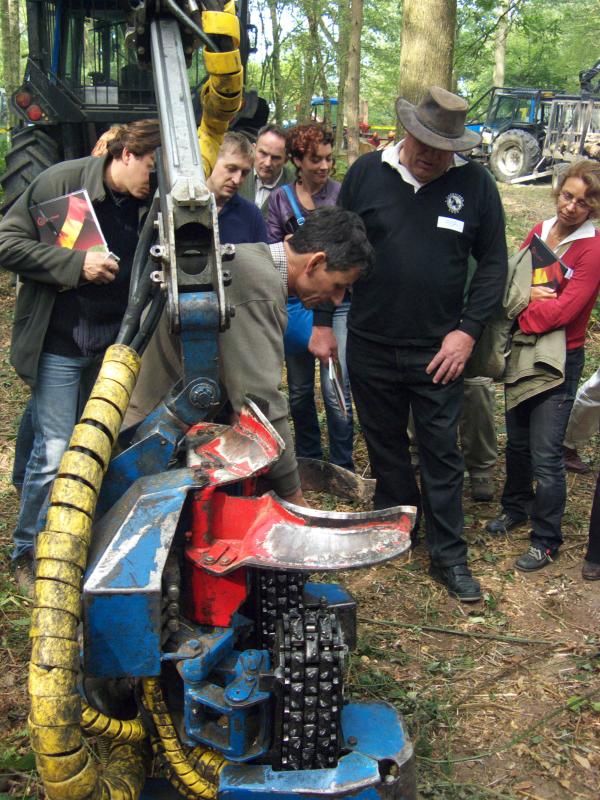
 Here's a short video of it in action, although sadly the operator couldn't fell a tree while we were there due to safety restrictions
Here's a short video of it in action, although sadly the operator couldn't fell a tree while we were there due to safety restrictions
One of the handy things about it is that while processing the tree it causes a lot of damage to the bark, which then helps the log dry out quickly - ideal for producing woodfuel! The point of seeing it was that harvesting heads such as this are normally fitted to very large vehicles, more than twice the size of this tractor. By fitting it to a tractor (which required some special fixings to be produced) a much more manoeuvrable system is produced, allowing it to work efficiently on woods where thinning is being carried out, as the trees being left must not be damaged. There was plenty of opportunity for us to ask the vehicle owner questions about how the system works and what it's pros and cons are:
The point of seeing it was that harvesting heads such as this are normally fitted to very large vehicles, more than twice the size of this tractor. By fitting it to a tractor (which required some special fixings to be produced) a much more manoeuvrable system is produced, allowing it to work efficiently on woods where thinning is being carried out, as the trees being left must not be damaged. There was plenty of opportunity for us to ask the vehicle owner questions about how the system works and what it's pros and cons are: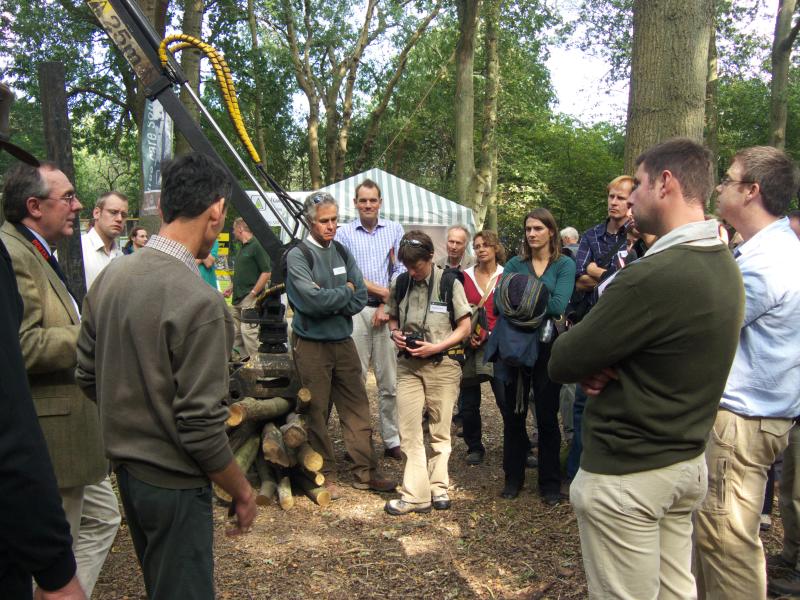 Personally, I'd prefer to see this kind of work done in what's known as "motor manual" style, which is basically people on the ground with chainsaws, and a small tractor for extracting the logs, but I can see that this doesn't work for everyone, so if this system means that woodfuel can be produced from woodland that would otherwise be left unmanaged, then that's good.
Personally, I'd prefer to see this kind of work done in what's known as "motor manual" style, which is basically people on the ground with chainsaws, and a small tractor for extracting the logs, but I can see that this doesn't work for everyone, so if this system means that woodfuel can be produced from woodland that would otherwise be left unmanaged, then that's good.
After the harvesting tractor, the next stop was machinery for processing the wood into logs for use in woodburners. There were various large hydraulic splitters that could run from the PTO (Power Take-Off) on a tractor:
 The split logs can then be cross-cut by a PTO-driven circular saw:
The split logs can then be cross-cut by a PTO-driven circular saw: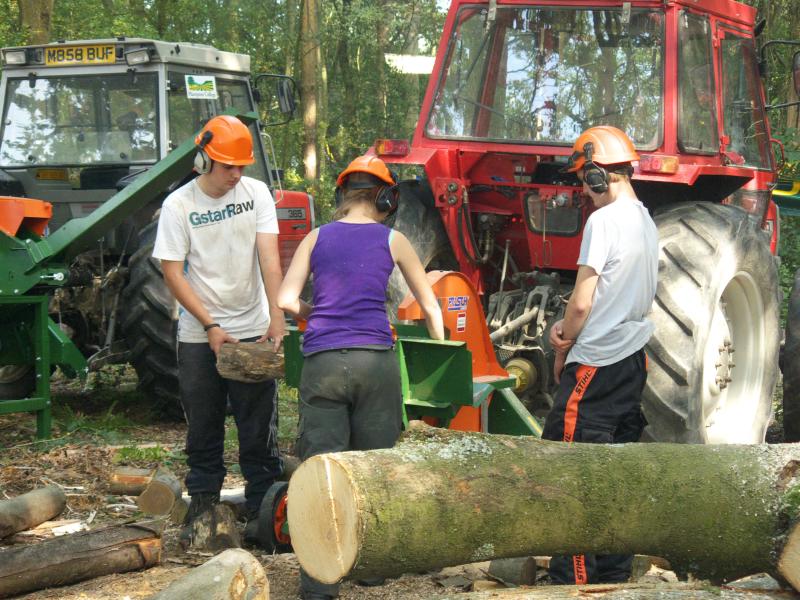 Alternatively, it is possible to use a single machine which cross-cuts a log and automatically triggers a hydraulic ram to split the section that's been cut off:
Alternatively, it is possible to use a single machine which cross-cuts a log and automatically triggers a hydraulic ram to split the section that's been cut off: The split pieces of wood are then carried up a conveyer belt to be dropped into a waiting truck:
The split pieces of wood are then carried up a conveyer belt to be dropped into a waiting truck:
 Of course, lighting a woodburner doesn't just need logs, you need kindling too, and we saw a machine for making that as well. Kindling is a higher-value product for a woodland owner to produce - converting logs into kindling can add up to 50% to their value.
Of course, lighting a woodburner doesn't just need logs, you need kindling too, and we saw a machine for making that as well. Kindling is a higher-value product for a woodland owner to produce - converting logs into kindling can add up to 50% to their value.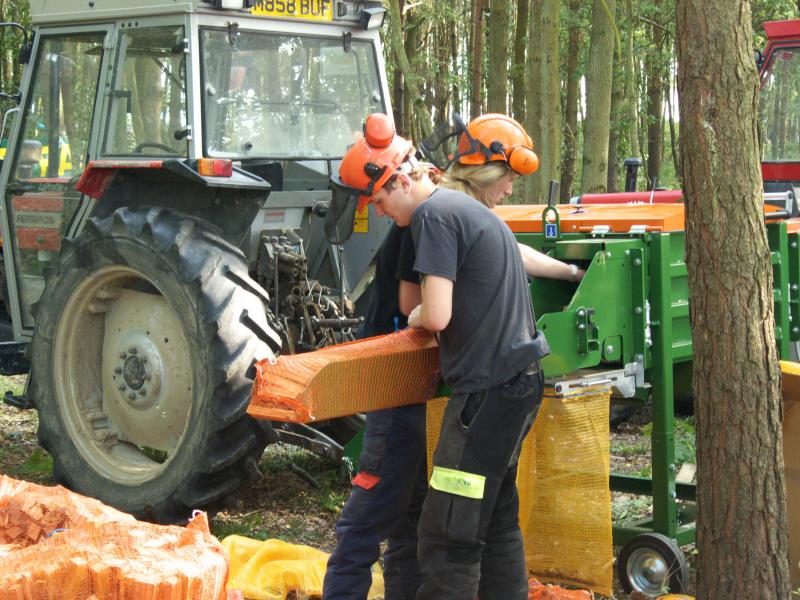
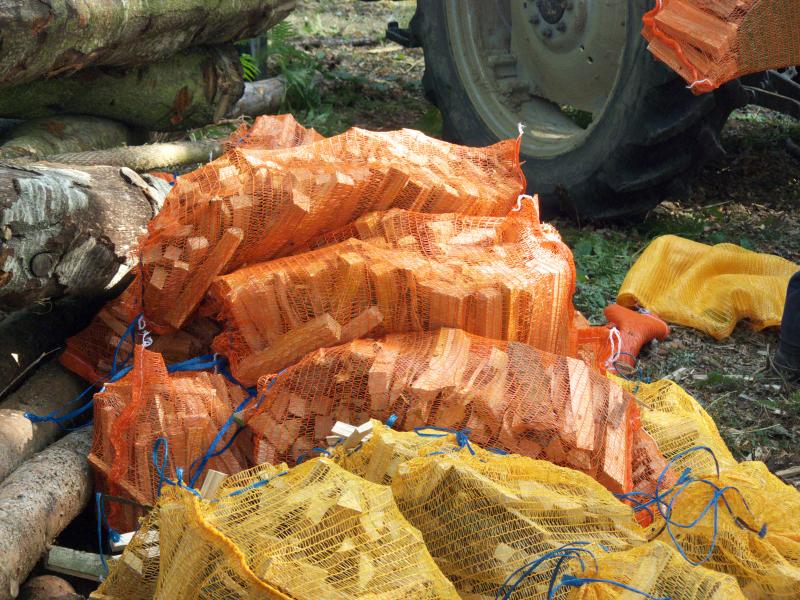 Finally, we went to see a large and a small machine producing woodchip, which can be used in automated boilers.
Finally, we went to see a large and a small machine producing woodchip, which can be used in automated boilers.




 Here's a video of the larger chipper in action:
Here's a video of the larger chipper in action:
Anyway, that was the afternoon, but in the morning I went to a series of short lectures. Here's the details:
Sally Marsh, Director of the High Weald AONB, opened the session by explaining that the region has 30% woodland cover, and could sustainably meet 15% of local heating needs. She also mentioned the woodland archaeology and biodiversity, which must always be considered in any woodland management plan.
Tom Vosper, of Creative Environmental Networks, explained the different regulations that affect the use of wood-fuel.
James Noble, of Esus Forestry and Woodlands, spoke to us about bringing neglected woodland back into sustainable management. A management plan must always start with clear goals, which could include sustainability, biomass fuel production, conservation and safety. Two key factors dictate the management options: what is possible with the woodland, and what is possible with the owner! Lack of management will gradually reduce the options available over time. The challenges facing owners wanting to manage woodland sustainably are:
Gillian Alker and Jane Hull, from the Forestry Commission, discussed the different grants that are available for producers and users of biomass fuel:
Julian Morgan-Jones, of South East Wood Fuels Ltd, explained some of the critical considerations for supplying fuel to end users. The key points were:
Well, that sums up the workshop, but there was also a lot of other wood-related stuff at the fair, such as mobile sawmills: chainsaw sculpture:
chainsaw sculpture: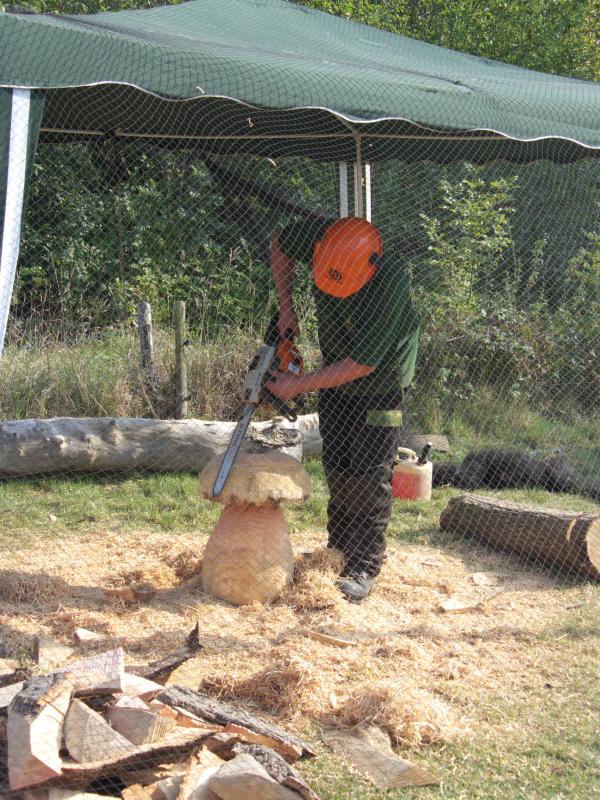 arrays of machinery:
arrays of machinery: traditional crafts:
traditional crafts:


 and crowds of people:
and crowds of people:
 For more information on organisations producing and using woodfuel, visit the Ashden Awards website.
For more information on organisations producing and using woodfuel, visit the Ashden Awards website.
Mike Pepler
Technical Manager
Ashden Awards






